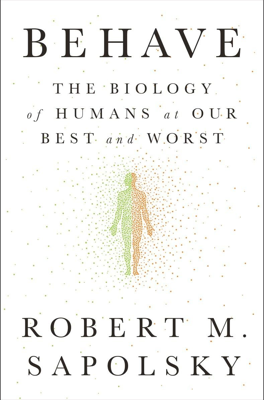Summary
Robert M. Sapolsky's book Behave delves into the intricate and multifaceted nature of human behavior, offering insights from multiple disciplines to illuminate the biological, psychological, and cultural influences on our actions. By examining how behaviors manifest from moments before they occur, to lifetimes and centuries of cultural impact, Sapolsky presents a compelling narrative about the complexity of behavior that transcends simple categorizations of good and evil.
Key Themes
The book extensively discusses neurobiological foundations, explaining how brain activity, particularly in the limbic and frontal cortex systems, dictates responses moments before an action is taken. It highlights the role of the triune brain model in processing everything from basic survival instincts to complex decision-making. Beyond immediate neural activities, sensory inputs and hormonal influences play significant roles, affecting behavior through mechanisms that range from subliminal cues to profound hormonal impacts, often dictating or modulating our actions in ways we barely perceive.
Extended Influences
On a broader timescale, Sapolsky explores how factors from hours to days before, like hormones, to days to months before, via neuroplasticity, shape our predispositions and reactions. The narrative then stretches into the developmental impacts, emphasizing critical periods like adolescence, and how the gradual maturation of the brain affects judgment and social behaviors. It also highlights how childhood experiences and cultural conditioning across centuries shape our behaviors, with cultural and evolutionary past influencing current norms and responses.
Societal and Moral Considerations
Sapolsky then embeds these discussions within societal and moral frameworks, discussing the role of culture, genetics, and evolution in crafting what we consider moral behavior, the dynamics of "Us" versus "Them," and our often subconscious adherence to social hierarchies. These insights culminate in a profound exploration of how innate and learned aspects of behavior mix with personal and societal influences to mold our actions.
Implications
Behave challenges the reader to reconsider the dichotomy of free will and determinism, raising important questions about the justice system's handling of criminal behavior in light of advanced neurobiological insights. The book not only maps out the complexities behind seemingly straightforward actions but urges a more compassionate and scientifically informed approach to addressing human behavior in social, educational, and legal contexts.
By weaving detailed scientific explanations with accessible narrative, Sapolsky provides a nuanced understanding of human behavior, emphasizing the importance of a multidimensional approach that considers both biological mechanisms and cultural contexts.
Per-chapter summary
- The Behavior
- One Second Before
- Seconds to Minutes Before
- Hours to Days Before
- Days to Months Before
- Adolescence; Or, Dude, Where’s My Frontal Cortex?
- Back to the Crib, Back to the Womb
- Back to When You Were Just a Fertilized Egg
- Centuries to Millennia Before
- The Evolution of Behavior
- Us Versus Them
- Hierarchy, Obedience, and Resistance
- Morality and Doing the Right Thing, Once You’ve Figured Out What That Is
- Feeling Someone’s Pain, Understanding Someone’s Pain, Alleviating Someone’s Pain
- Metaphors We Kill By
- Biology, the Criminal Justice System, and (Oh, Why Not?) Free Will
- War and Peace
